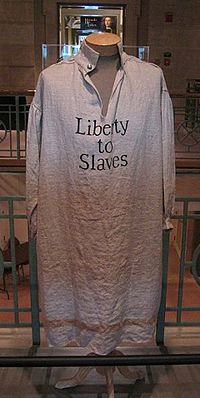Black Loyalist facts for kids
Quick facts for kids Black Loyalist |
|
|---|---|

Smock similar to those worn by Black Loyalist soldiers in Lord Dunmore's Ethiopian Regiment
|
|
| Active | 1775–1784 |
| Country | |
| Allegiance | |
| Branch | British provincial units, Loyalist militias, associators |
| Type | infantry, dragoons (mounted infantry), irregular, labor duty |
| Size | companies-regiments |
| Engagements | American Revolutionary War |
| Commanders | |
| Notable commanders |
Both white British military officers and Black Loyalist officers |
Black Loyalists were African Americans who supported the British during the American Revolutionary War (1775–1783). Some of these individuals were formerly enslaved people who joined the British side to gain their freedom. Others were free people of color who chose to remain loyal to Britain. There were also enslaved people who belonged to white Loyalists and were forced to support the British.
Contents
Why Black Loyalists Fought for Britain
During the American Revolutionary War, the American colonies fought for independence from Great Britain. Many enslaved African Americans saw this war as a chance to gain their own freedom.
The Promise of Freedom
In November 1775, Lord Dunmore, who was the royal governor of Virginia, made an important announcement. This was called Dunmore's Proclamation. He was facing a rebellion and needed more soldiers.
Lord Dunmore promised freedom to enslaved people who belonged to the rebels if they joined the British Army. This offer caused a lot of discussion. Some slave owners who supported Britain worried about a large uprising of enslaved people.
Joining the British Army
Despite these worries, about 800 African Americans quickly went to Norfolk, Virginia, to join the British forces. Lord Dunmore organized them into a group called the Ethiopian Regiment. This was one of the first times enslaved people were offered freedom for military service in American history.
Although the Ethiopian Regiment did not fight in many battles and was later disbanded, other Black Loyalist units were formed. Other British commanders, like Guy Carleton and Lord Cornwallis, also made similar promises of freedom.
Life After the War
After the American Revolutionary War ended and the United States became independent, the British helped many Black Loyalists move to new places.
New Homes in Nova Scotia
A large number of Black Loyalists were moved to Nova Scotia, a region in what is now Canada. They helped build new communities there.
Moving to Sierra Leone
Some Black Loyalists also moved to London, England. People in London felt sympathy for these former soldiers who had fought for Britain. An organization called the Committee for the Relief of the Black Poor helped some of them settle in Sierra Leone in West Africa.
Later, some of the Black Loyalists who had moved to Nova Scotia also decided to move to Sierra Leone. Their descendants today are known as the Sierra Leone Creole people.
Images for kids
-
Reverend William Furmage, Old Burying Ground (Halifax, Nova Scotia), Huntingdonian Missionary to the Black Loyalists; established school for Black students in Halifax (1786)
-
A Black Loyalist wood cutter, at Shelburne, Nova Scotia, in 1788
-
Lawrence Hartshorne, d. 1822, a Quaker who was the chief assistant of John Clarkson in helping the Black Nova Scotian Settlers emigrate to Sierra Leone (1792), Old Burying Ground (Halifax, Nova Scotia)
See also
 In Spanish: Lealista negro para niños
In Spanish: Lealista negro para niños
 | Charles R. Drew |
 | Benjamin Banneker |
 | Jane C. Wright |
 | Roger Arliner Young |




